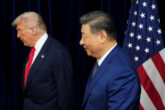September 30, 2015
Japan's Evolving Role in Defense and Security
CNAS recently hosted LTG Koichiro Bansho of the Japanese Ground Self-Defense Forces for a discussion on Japan’s evolving role in defense and security. General Bansho set the stage by describing the “three fronts” Japan faces in assessing strategic threats: an ascendant China, an unstable North Korea, and large-scale regional disasters.
Aggressive behavior on the part of China has prompted a reorientation of the JSDF from its typical northern posture. During the Cold War the JSDF was primarily concerned with Russian movement across the Sea of Okhotsk. Following the collapse of the Soviet Union and presented with contemporary Chinese aggression in the region, Japan began focusing its Self-Defense Forces on contingencies related to the South and East China Seas.
Bansho also highlighted the policy changes recently enacted by the Abe government in Japan. The new national security legislation would allow Japan to provide what General Bansho called a “proactive contribution to peace.” But in addition to the expansion of the JSDF’s constitutional authorities, Bansho also pointed to substantial improvements in the Force’s modern capabilities. In particular, Bansho touted the development of more robust amphibious units designed to retake outer islands in the event of a crisis.
Discussants praised the overall JSDF’s remarkable modernization progress, but also expressed concern over the Force’s “jointness,” pointing to reports that the three branches of the JSDF may still place insufficient emphasis on collaborating in the field. There was unanimous agreement, however, that the JSDF Navy and U.S. Navy enjoy cooperation and interoperability on par with the U.S. and the United Kingdom.
More from CNAS
-
Chinese Maker of Bitcoin-Mining Machines Is a Security Threat, Says Expert
Bloomberg News reports that a Chinese manufacturer, Bitmain Technologies Ltd, that sells most of the world’s Bitcoin-mining machines — including 16,000 of them to a venture ba...
By David Feith
-
Indo-Pacific Security / Energy, Economics & Security
North Korea’s Provocations, Power Plays, and Shifting AlliancesTensions on the Korean Peninsula have reached a new and dangerous threshold. President Lee Jae Myung is warning of a real risk of accidental military clashes, as the situation...
By Dr. Go Myong-Hyun
-
Indo-Pacific Security / Energy, Economics & Security
How to Win the Economic War with ChinaTrump's approach to China has run aground, giving Beijing unprecedented advantage in the economic conflict....
By Edward Fishman & Julian Gewirtz
-
Indo-Pacific Security / Technology & National Security
Sharper: Tech + ChinaRecent talks between President Donald Trump and Chinese Communist Party General Secretary Xi Jinping placed a spotlight on emerging technologies, from high-end chips to minera...
By Charles Horn & Sevi Silvia




